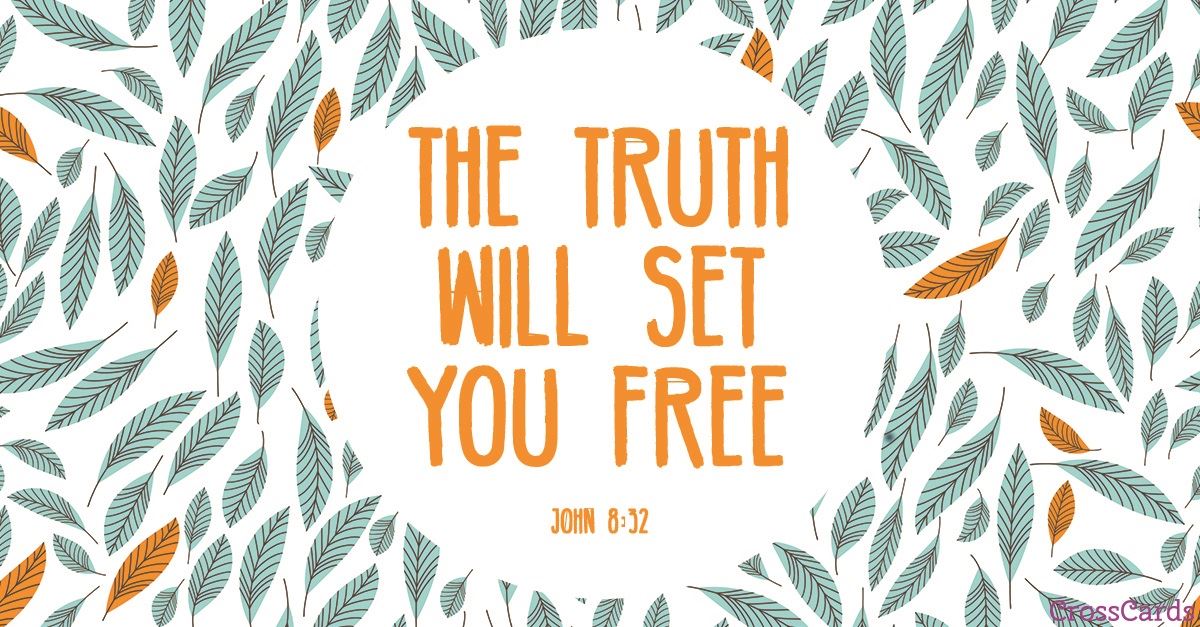"The Truth Will Set You Free" - What it Means & Why Jesus Said It
Share

You may have heard this saying in an academic setting before; “the truth will set you free” could certainly apply to learning and gaining new knowledge. However, the original intent of this phrase refers to a spiritual freedom from the bondage of sin. Let’s explore what truth means for us from this Bible passage.
“So Jesus said to the Jews who had believed in him, ‘If you abide in my word, you are truly my disciples, and you will know the truth, and the truth will set you free.’ They answered him, ‘We are offspring of Abraham and have never been enslaved to anyone. How is it that you say, 'You will become free'?’ Jesus answered them, ‘Truly, truly, I say to you, everyone who commits sin is a slave to sin. The slave does not remain in the house forever; the son remains forever. So if the Son sets you free, you will be free indeed. I know that you are offspring of Abraham; yet you seek to kill me because my word finds no place in you. I speak of what I have seen with my Father, and you do what you have heard from your father’" (John 8:31-38).
What is Truth?
Truth is defined by Merriam Webster as the actuality of things or events, fact, or spiritual reality. Other definitions of truth have to do with sincerity in action or character, while others literally refer to God. The opposite of truth, then, is lies, falsity, fiction, and falsehood. No matter how it is viewed, truth bears the fruit of trust, and many of us spend our entire lives looking for it. The intrinsic desire for truth is what gives us that deep, personal longing to answer questions like “what is my purpose,” “who am I,” or “who do I serve?”
Who said “the truth will set you free” in the Bible?
John 8 begins with the story of the teachers of the law and the Pharisees bringing in a woman caught in adultery. They have her stand in front of a group while they announce her sin, and state that per the law of Moses, she should be stoned. In response, Jesus begins writing in the sand with his finger, and then says, “Let any one of you who is without sin be the first to throw a stone at her.” People began disbanding from the group, while only Jesus remained. He asks the woman if anyone had condemned her yet, and when she says no, he tells her to “Go now and leave your life of sin.”
This led to dispute of who Jesus actually was. He explained to the Jewish people that he was not of this world, and that he is only doing what the Father taught him. In John 8:31-32, Jesus said (to those who believed Him), “You are truly my disciples if you remain faithful to my teachings. And you will know the truth, and the truth will set you free.”
What is the context "the truth will set you free" and who heard it?
Ellicott’s Commentary expands on the context of this verse in this way; on “the truth will set you free” it adds that “truth and holiness are spoken of as correlative,” as read in John 17:17. The verse says, “Sanctify them by the truth; your word is truth.” At this time, people limited freedom to being free from slavery or Roman rule. But Jesus meant “truth” and “free” as far deeper things.
The commentary goes on to say, “Sin is the bondage of the powers of the soul, and this bondage is willed because the soul does not see its fearful evil. When it perceives the truth, there comes to it a power which rouses it from its stupor, and strengthens it to break the fetters by which is has been bound.” When Jesus said, “If you remain faithful to my teachings…” He was referring to the law that sums up all the law of the commandments as found in Matthew 22:37-40:
“Jesus replied: ‘Love the Lord your God with all your heart and with all your soul and with all your mind.’ This is the first and greatest commandment. And the second is like it: ‘Love your neighbor as yourself.’ All the Law and the Prophets hang on these two commandments.”
In summary, it says we should love God and love people. Carrying out the stoning of a woman in sin does not show a graceful, merciful love. The grace that Jesus offered her gave her an opportunity that most certainly raised her spirit to truth and gave a glimpse of spiritual freedom.

What does "the truth will set you free" mean for Christians today?
The truth, which will set us free, still applies the same way today. Although today we don’t seek safety from the corruption of the Roman empire, we still all suffer under the bondage of sin. Perhaps today we seek safety from debt, stress and anxiety, lack of discipline, or a number of other issues. If we are focused on these wordly needs, then we will likely limit a verse like “the truth will set you free” to the things we want or need. However, what Jesus taught us in John 8:32 hits our soul, not only our minds, and is greater than our emotions.
How we can live this out every day
There are several ways that we can shift our focus to the spiritual aspect of Jesus’ teaching. The first is focusing on how we can demonstrate the grace and loving kindness that Jesus shared with the woman caught in adultery. The teachers of the law that wanted to condemn the woman were living their lives in fear. They were in protection mode of the law. In that protection, they considered those who broke the law to be a threat to them. Do you feel that you protect yourself from people, or do you allow a graceful love to flow through you at any given moment?
The second way we can make an adjustment to live out a life of truth and freedom is simply by seeking God. We can start doing this by allowing ourselves grace from our own mistakes, resting in the truth of who we are through Christ. We are forgiven. We have been extended the precious gift of grace. To become closer to God, we must first allow this truth to be one within us. From there, we can absorb His word more fruitfully. As we become anchored in our identity with the Father, then we can finally abandon that old stance of viewing others as threats. After all, feeling so threatened shines light on how we attempt to take up our own lordship. Fear is born out of punishment, and perfect love has cast all of it out (1 John 4:18). It is our decision to leave it there. You can read more verses about fear here.
Today, imagine someone showing you the grace you so desperately seek. Or imagine someone showing you kindness despite anything you have done. Let that heal you, even if just for a moment. Practice this more and more each day as you begin to break off the bondage of fear. Receiving God’s grace, and then extending it beyond ourselves is precisely what Jesus intended to teach us when He said “the truth will set you free.” You are free indeed.
Kyle Blevins is the sole contributor to the blog, REDIRECTED, which focuses on rediscovering purpose through love. His broken life reached a turning point after being surrounded by positive people who believed he was capable of more. His passion is connecting with and encouraging those looking for a new beginning in life and in Christ. You can follow his blog at iamredirected.com.
Photo credit: Unsplash/KalVisuals